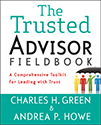This post is part of our Weekly Tips series.
This week, I want to be sure credibility gets its fair share of the spotlight.
Here’s my favorite piece of advice for building credibility: admit what you don’t know.
I’ve been in and around the consulting industry for nearly 25 years and I know very few consultants who are comfortable not knowing an answer to a question (myself included). Poor souls, we’re burdened by the belief that clients not only want answers, they want the right answers … and right away. This leads to a lot of well-intended bad behavior. Like ever-so-slightly exaggerating what we do know in order to fill in the gaps. Or allowing silence to cover for us.
The alternative is having the courage to say “I don’t know” when you don’t know—with candor, clarity, confidence. And therein lies the plot twist: when we’re OK to admit what might be perceived as weakness, people see our strength.
“I don’t know” builds credibility for one simple reason: it shows you are honest. Your truthfulness communicates something as important, if not more important, than what’s on your resume: that above all else, you are someone who can be counted on to be real.
My co-author Charlie Green’s version of this little piece of advice: freely confess ignorance. To quote Charlie, “After all, technical knowledge can always be looked up; personal courage and integrity are in far shorter supply.”
Hear hear.
Make It Real
This week, notice every time you’re tempted to put a little spin on your response to someone, or to tell a little lie by omission—at work or at home. Just notice. Then script in your head what it would sound like if you responded in a more direct way instead. (Bonus: do just that.)
Learn More

Learn about seven other ways to make others believe what you tell them, from our friends at Trusted Advisor Associates, or learn more about the trust equation in Chapter 4 of The Trusted Advisor Fieldbook: A Comprehensive Toolkit for Leading with Trust.
